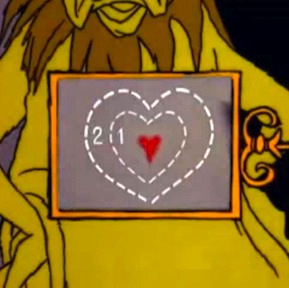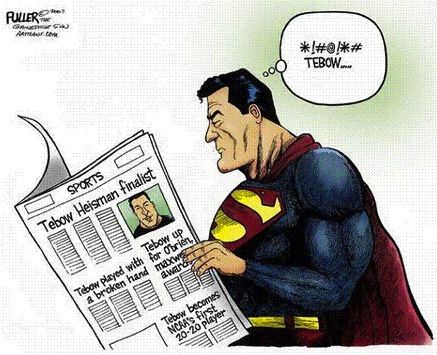
1. Some new research on the importance of generosity in marriage and relationships has been making the rounds this week, and the soundbites are amusing in their captain-obvious-ness. Generosity here being very close to what we would call grace, and the relational dynamic it characterizes being one that by and large does away with scorekeeping, exposing egalitarian notions of the 50-50 split as the recipe for resentment that they often are (100-100 being the happier and, ironically, less legalistic ideal). The research also implicitly condemns models of relating based on self-fulfillment rather than self-sacrifice. Go figure! Of course, knowing what’s right/healthy in a relationship and being able to act on it are two very different things. The Atlantic had this to say:
“Our report suggests, in contrast, that in today’s marriages both wives and husbands benefit when they embrace an ethic of marital generosity that puts the welfare of their spouse first. That is, both are happier in their marriages when they make a regular effort to serve their spouse in small ways — from making them a cup of coffee, to giving them a back rub after a long day, to going out of their way to be affectionate or forgiving.”
While The NY Times Magazine put it this way:
While sexual intimacy, commitment and communication are important, the focus on generosity adds a new dimension to our understanding of marital success. Though this conclusion may seem fairly self-evident, it’s not always easy to be generous to a romantic partner… “In marriage we are expected to do our fair share when it comes to housework, child care and being faithful, but generosity is going above and beyond the ordinary expectations with small acts of service and making an extra effort to be affectionate,” explains the University of Virginia’s W. Bradford Wilcox, who led the research. “Living that spirit of generosity in a marriage does foster a virtuous cycle that leads to both spouses on average being happier in the marriage.”
2. NPR broadcast an interesting segment this week about the link between creativity and dishonesty, and the results were a bit startling, if also pretty reminiscent of our recent series on Self-Justification, ht JD:
In all five of Gino and Ariely’s experiments, creativity was clearly correlated with increased dishonesty. And though they are not yet fully able to demonstrate it, both Gino and Ariely feel like creativity increased dishonesty precisely because it allowed people to genuinely see credible rationalizations where others could not. “If you are a creative person, all of a sudden you can go through the same amount of evidence and find many more links to justify the position that you want to have to start with.”
3. Speaking of self-justification, there’s the hilarious “Area Man Carefully Weighs One Side of the Argument” over at The Onion.
4. Super insightful Mbird friend Margaret Evans wrote an absolutely terrific installment of her bi-weekly column in The Low Country Weekly on the beauty and profundity of seasonal conversion stories entitled, “Scrooge, the Grinch and Me.” Now if only we could get her to write for us…:
In his unfailing wisdom, Dr. Seuss knew what few of us care to acknowledge these days: that some people are bad for no good reason. For people like that, the only real hope is something drastic. Something radical. I call it “conversion.” You might call it something different. Whatever you call it, it’s nothing short of a metaphorical heart transplant. And that’s just what happens to the Grinch.
As much as I enjoy a “good guys finish first if they just hang in there” tale, I suspect there’s a lie at the heart of that story. I’ve seen too many bad things happen to good people… and vice versa. I don’t need to be sold a bill of goods about “karma” and life being “fair” and “things working out in the end.” Deep down, I don’t believe in that story.
But what I do believe in – because I’ve experienced it, firsthand – is conversion. Which comes from the word “convert.” Which means “to change, transform, transmute, alter, turn.” I know that conversion is real, and I know that it makes all the difference in the world – not because it changes the world, but because it changes our perspective on the world… and, thus, our approach to the world. But it’s not a one-time deal. Despite what Dickens tells us, I think conversion must happen over and over, again and again. I have to keep seeking transformation – keep turning toward love – every minute of every day. And I can’t always do it alone. Like Scrooge, I sometimes need a wonderful, terrible ghost to wake me up, shake me up, and remove the scales from my eyes.
5. The increasingly wonderful Grantland ran a piece by Chuck Klosterman this week called “The People Who Hate Tim Tebow” that bore some eerie similarities to what Nick Lannon posted here a few weeks ago. Like Nick’s inspired post, it deals not with Tebow himself but with the fierce response he has been producing:
This, I think, is what makes Tebow so maddening to those who hate him: He refuses to say anything that would validate the suspicion that he’s fake (or naïve or self-righteous or dumb)… It’s not that he usually says the right things; he only says the right things, all the time. As a result, he fuels a quasi-tautological reality that makes his supporters ecstatic, even if they don’t accept it as wholly valid.
6. Speaking of Grantland, they also posted a spot-on manifesto on “How We’d Fix The Walking Dead”. What a disappointing first half of the season that show has had – or was it never really that good? Pop culture junkies out there should take serious note of The A/V Club’s T.V. Club Advent Calender series. Last week they covered the lost treasure “A Muppet Family Christmas” and then this week they featured the classic Twilight Zone Christmas episode “The Night of the Meek,” in reference to which they dropped the following line:
The darkness here isn’t about evil moneygrubbers and hearts clotted with greed; it’s the regular old horror of human frailty, and the inability to have our best intentions match our actions.
[youtube=http://www.youtube.com/watch?v=YGwHJL4RyOg&w=550]
7. Finally, the Wall Street Journal ran a very intriguing book review a couple weeks ago of David M. Kennedy’s Don’t Shoot: One Man, a Street Fellowship and the End of Violence in Inner-City America. Despite the Just-Say-No/DARE headline and overtones, if you read between the lines you’ll hear what sounds quite a bit like an inspiring story of Law and Grace in law enforcement. Essentially, instead of using raids to break up powerful drug rings, police in Boston under Mr. Kennedy’s direction would arrest the most violent offenders and then bring in those further down on the totem pole and explicitly show them some mercy, ht WDR:
Mr. Kennedy writes of bringing street-corner drug dealers in for meetings with policemen, prosecutors and community-service workers. There the dealers would be told, truthfully, that the police had cases on them all ready to take to court—evidence of hand-to-hand drug sales and the like, on videotape. Then the cops would say: We don’t want to arrest you; we want you to stop; and we want to help you stop. And many of them did stop. In Baltimore, Minneapolis, Cincinnati and other cities the targeted neighborhoods saw drug markets disappear almost overnight or diminish dramatically, along with the attendant violence.
8. Finally, we sent out a big Mockingbird e-newsletter yesterday, which you can read here. We need your help!
[youtube=www.youtube.com/watch?v=2MFn8L9tIrg&w=600]

COMMENTS
One response to “Another Week Ends: Generous Marriages, Creative Cheaters, Converted Grinches, Tebow Haters, Twilight Zone Xmases, Gracious Police and Walter”
Leave a Reply














That Klosterman piece was just magnificent. Probably the best thing ever written on Tebow, though I’m interested to read Dan Foster’s piece in National Review. Klosterman really had a hint of “God moving over the waters” in his essay, suggesting that maybe part of what makes non-believing Tebow haters so uncomforable is that maybe Christianity has something going for it. Klosterman: “He is making people wonder if they should try to believe things they don’t actually believe.” Of course we know that Christianity is more than mission trips and 4th quarter comebacks, but the whole idea of defying skepticism…it’s not altogether wrong headed.